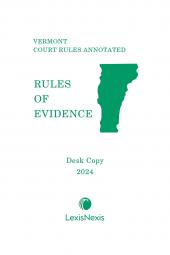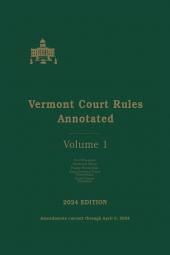We are in the process of migrating the LexisNexis Store. During this transition, some customers may not be able to access their Download Center or new electronic orders. Please call Customer Service 1-800-833-9844 or Chat With A Support Representative <https://supportcenter.lexisnexis.com/app/chat/store_chat/>
Vermont Rules of Evidence: Desk Copy
Select a format
 International Order Inquiry
International Order Inquiry
Select subscription type
Terms & conditions
Subscribers receive the product(s) listed on the Order Form and any Updates made available during the annual subscription period. Shipping and handling fees are not included in the annual price.
Subscribers are advised of the number of Updates that were made to the particular publication the prior year. The number of Updates may vary due to developments in the law and other publishing issues, but subscribers may use this as a rough estimate of future shipments. Subscribers may call Customer Support at 800-833-9844 for additional information.
Subscribers may cancel this subscription by: calling Customer Support at 800-833-9844; emailing customer.support@lexisnexis.com; or returning the invoice marked "CANCEL".
If subscribers cancel within 30 days after the product is ordered or received and return the product at their expense, then they will receive a full credit of the price for the annual subscription.
If subscribers cancel between 31 and 60 days after the invoice date and return the product at their expense, then they will receive a 5/6th credit of the price for the annual subscription. No credit will be given for cancellations more than 60 days after the invoice date. To receive any credit, subscriber must return all product(s) shipped during the year at their expense within the applicable cancellation period listed above.
The total price includes the product(s) listed in the Order Form and any Updates for a limited period (minimum period of 30 days) after the order is placed ("Order Window"). Shipping and handling fees are not included in the grand total price.
All shipments may be returned, at subscribers' expense, for full credit of the Price within 30 days of receipt.
Shipments may not be returned, and no credits will be issued, more than 30 days after receipt.
After the Order Window, subscribers will receive notice of Updates along with the then-current grand total price and order process as Updates become available. Subscribers will only be shipped those Updates they specifically request.
Product description
View a sample of this title using the ReadNow feature
This newest edition of Vermont Rules of Evidence Desk Copy is a lightweight, economical and durable softbound volume you can easily carry to court or keep on your desktop. It contains the Vermont Rules of Evidence, cross references to rules of a related nature, annotated Vermont Supreme Court decisions construing the rules, notes describing changes to the rules affected by orders of the Vermont Supreme Court, a conveniently organized table of relevant statutes, and a comprehensive index for quick reference, so you can find what you need when you need it fast. We publish an updated edition annually, and the low price point means you can purchase a new copy every year to ensure you are going to court prepared.
Let your clients--and the opposing counsel-- see how much you care about their case when you walk into the courtroom with the most recent edition of the Vermont Rules of Evidence Desk Copy from LexisNexis, the official publisher of Vermont Statutes Annotated and the official provider of online primary source content for the Vermont judiciary.
The previous edition's ISBN is 9781663376190.
eBooks, CDs, downloadable content, and software purchases are noncancelable, nonrefundable and nonreturnable. Click here for more information about LexisNexis eBooks. The eBook versions of this title may feature links to Lexis+® for further legal research options. A valid subscription to Lexis+® is required to access this content.
Table of contents
Rules of Evidence
ARTICLE I. GENERAL PROVISIONS
Rule
101. Scope.
102. Purpose and Construction.
103. Rulings on Evidence.
104. Preliminary Questions.
105. Limited Admissibility.
106. Remainder of or Related Writings or Recorded Statements.
ARTICLE II. JUDICIAL NOTICE
201. Judicial Notice of Adjudicative Facts.
ARTICLE III. PRESUMPTIONS
301. Presumptions in Civil Cases.
302. [Reserved.]
303. Presumptions in Criminal Cases.
ARTICLE IV. RELEVANCY AND ITS LIMITS
401. Definition of “Relevant Evidence”.
402. Relevant Evidence Generally Admissible; Irrelevant Evidence Inadmissible.
403. Exclusion of Relevant Evidence on Grounds of Prejudice, Confusion, or Waste of Time.
404. Character Evidence Not Admissible To Prove Conduct; Exceptions; Other Crimes, Wrongs or Acts.
405. Methods of Proving Character.
406. Habit; Routine Practice.
407. Subsequent Remedial Measures.
408. Compromise and Offers To Compromise.
409. Payment of Medical and Similar Expenses.
410. Inadmissibility of Pleas, Plea Discussions, and Related Statements.
411. Liability Insurance.
412. Inadmissibility of Statements Made by Ward To Guardian Ad Litem.
ARTICLE V. PRIVILEGES
501. Privileges Recognized Only as Provided; Statutory Privileges.
502. Lawyer-Client Privilege.
503. Patient's Privilege.
504. Husband-Wife Privilege.
Rule
505. Religious Privilege.
506. [Reserved.]
507. [Reserved.]
508. [Reserved.]
509. Identity of Informant.
510. Waiver of Privilege and Work-Product by Disclosure.
511. Privileged Matter Disclosed Under Compulsion or Without Opportunity to Claim Privilege.
512. Comment Upon or Inference From Claim of Privilege: Instruction.
ARTICLE VI. WITNESSES
601. Competency in General: Disqualification.
602. Lack of Personal Knowledge.
603. Oath or Affirmation.
604. Interpreters.
605. Competency of Judge as Witness.
606. Competency of Juror as Witness.
607. Who May Impeach.
608. Evidence of Character and Conduct of Witness.
609. Impeachment by Evidence of Conviction of Crime.
610. Religious Beliefs or Opinions.
611. Mode and Order of Interrogation and Presentation.
612. Writing or Object Used to Refresh Memory.
613. Prior Statements of Witness.
614. Calling and Interrogation of Witnesses by Court.
615. Exclusion of Witnesses.
ARTICLE VII. OPINIONS AND EXPERT TESTIMONY
701. Opinion Testimony by Lay Witness.
702. Testimony by Experts.
703. Factual Bases of Opinion Testimony by Experts.
704. Opinion on Ultimate Issue.
705. Disclosure of Facts or Data Underlying Expert Opinion.
706. Court Appointed Experts.
ARTICLE VIII. HEARSAY
801. Definitions.
802. Hearsay Rule.
803. Hearsay Exceptions: Availability of Declarant Immaterial.
804. Hearsay Exceptions: Declarant Unavailable.
804a. Hearsay Exception; Putative Victim Age 12 or Under; Person with a Mental Illness or Developmental Disability.
RULES OF EVIDENCE
Rule
805. Hearsay Within Hearsay.
806. Attacking and Supporting Credibility of Declarant.
807. Testimony Where Victim Is a Minor Or a Person with a Psychiatric, Intellectual, or Developmental Disability.
ARTICLE IX. AUTHENTICATION AND IDENTIFICATION
901. Requirement of Authentication or Identification.
902. Self-authentication.
903. Subscribing Witness' Testimony Unnecessary.
ARTICLE X. CONTENTS OF WRITINGS, RECORDINGS, AND PHOTOGRAPHS
1001. Definitions.
1002. Requirement of Original.
1003. Admissibility of Duplicates.
1004. Admissibility of Other Evidence of Contents.
1005. Public Records.
1006. Summaries.
1007. Testimony or Written Admission of Party.
1008. Functions of Court and Jury.
ARTICLE XI. MISCELLANEOUS RULES
1101. Applicability of Rules.
1102. Effective Date.
1103. Title.
ARTICLE I. GENERAL PROVISIONS
RULE 101. SCOPE
These rules govern proceedings in the courts of this State to the extent and with the exceptions stated in Rule 1101.
Reporter's Notes
This rule is identical to Uniform Rule 101 and is similar in language and effect to Federal Rule 101. This rule states the applicability of the Rules of Evidence in general terms. Rule 1101 specifies in detail the courts, proceedings, questions, and stages of proceedings to which the rules apply. The Vermont Rules of Evidence are promulgated by the Supreme Court under the authority of the Vermont Constitution, Ch. II, § 37, which provides that the Court ''shall make and promulgate rules governing practice and procedure in civil and criminal cases in all courts,'' and that any such rule ''may be revised by the General Assembly.'' The legislature has recognized that Rules of Evidence are ''rules governing practice and procedure'' in a 1982 amendment to 12 V. S.A. § 1.
 Lexis Nexis
Lexis Nexis 
